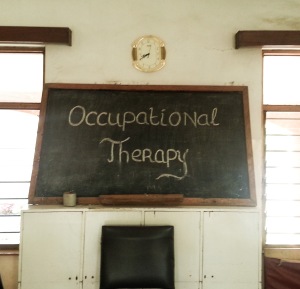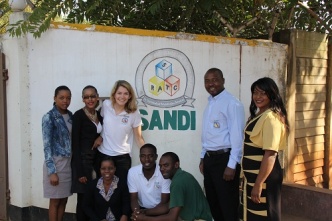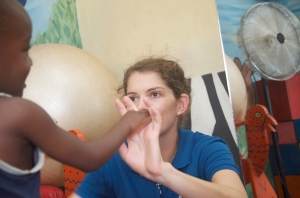We affectionately call her ‘Chima’ and she said it better than I could: 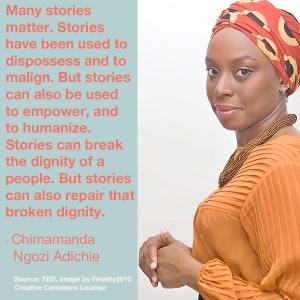 I agree that there is power in stories, I have this platform to share my own stories. A big part of my story is made up of the privileged reality that I share many others’ stories. It is through sharing these stories that many of the wrong ‘single stories’ I carried have been broken down. The single stories about what is development, what is love and the value of business in bringing both these things. I wanted to take a moment to share a few of the stories of people whom inspire me and challenge me. I feel privileged to share life, including the challenges and the successes with these people!
I agree that there is power in stories, I have this platform to share my own stories. A big part of my story is made up of the privileged reality that I share many others’ stories. It is through sharing these stories that many of the wrong ‘single stories’ I carried have been broken down. The single stories about what is development, what is love and the value of business in bringing both these things. I wanted to take a moment to share a few of the stories of people whom inspire me and challenge me. I feel privileged to share life, including the challenges and the successes with these people! 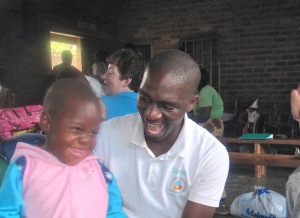 This is Chawanangwa Mughogho. Chawa is a Rehabilitation Technician who I work with at Sandi Rehabilitation in Malawi. He is applying and seeking funding to study Occupational Therapy in South Africa, starting January 2015. Chawa has already had to show incredible persistence and investment, simply to embark on the application process. He inspires me with his passion for children and his ability to capture children with his laughter and energy. Chawa’s commitment and passion for helping children with disabilities in Malawi inspires me to believe that God is bringing the healing he promised the world in amazing ways.
This is Chawanangwa Mughogho. Chawa is a Rehabilitation Technician who I work with at Sandi Rehabilitation in Malawi. He is applying and seeking funding to study Occupational Therapy in South Africa, starting January 2015. Chawa has already had to show incredible persistence and investment, simply to embark on the application process. He inspires me with his passion for children and his ability to capture children with his laughter and energy. Chawa’s commitment and passion for helping children with disabilities in Malawi inspires me to believe that God is bringing the healing he promised the world in amazing ways. 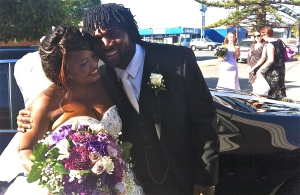 This is Elizabeth and Emmanuel. Elizabeth moved to Australia a little over 7 years ago as a refugee from Ghana. She was 7 months pregnant with her daughter Blessing. Emmanuel; Blessing’s Father was sent to Canada as a refugee. For over five years these two lived on opposite sides of the planet, yet they persisted in their love. Two weeks before I moved to Malawi, Emmanuel moved to Australia for the long awaited wedding and to finally be with his family. One of the greatest privileges of my year was flying back to Australia to surprise these guys at their wedding. At their wedding I shared that regardless of whether I am single or married, I know that when I arrive at the pearly gates someday, I will declare “I lacked no experience of love”. I know this because I get to share beautiful stories of love with people like Liz and Emmanuel.
This is Elizabeth and Emmanuel. Elizabeth moved to Australia a little over 7 years ago as a refugee from Ghana. She was 7 months pregnant with her daughter Blessing. Emmanuel; Blessing’s Father was sent to Canada as a refugee. For over five years these two lived on opposite sides of the planet, yet they persisted in their love. Two weeks before I moved to Malawi, Emmanuel moved to Australia for the long awaited wedding and to finally be with his family. One of the greatest privileges of my year was flying back to Australia to surprise these guys at their wedding. At their wedding I shared that regardless of whether I am single or married, I know that when I arrive at the pearly gates someday, I will declare “I lacked no experience of love”. I know this because I get to share beautiful stories of love with people like Liz and Emmanuel. 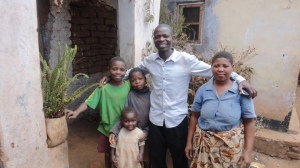 This is Jastin Chikuse with his family. Jastin works at my house as the gardener. Jastin inspires me with his passion for learning, his deep care for his family and his drive to contribute positively to the world. Jastin is a trained to run support groups for those wo are HIV positive and he runs trainings for others around organic and sustainable gardening techniques. Jastin is unfailing in his warmth and happiness towards me and generous in inviting me into his life to meet with his family and friends. Jastin is working towards building a new house and hopes to further his knowledge and studies in agriculture and gardening one day.
This is Jastin Chikuse with his family. Jastin works at my house as the gardener. Jastin inspires me with his passion for learning, his deep care for his family and his drive to contribute positively to the world. Jastin is a trained to run support groups for those wo are HIV positive and he runs trainings for others around organic and sustainable gardening techniques. Jastin is unfailing in his warmth and happiness towards me and generous in inviting me into his life to meet with his family and friends. Jastin is working towards building a new house and hopes to further his knowledge and studies in agriculture and gardening one day. 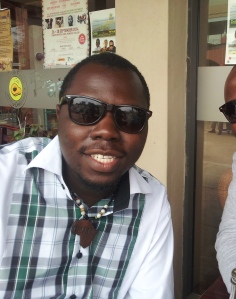 This is Ndawa Lungu. Ndawa and I share a Growth Group (aka bible study) every week. I get the privilege of hearing about and sharing in whats happening in Ndawa’s life. Ndawa owns and runs a company called Idea265, Malawi’s first design studio (http://www.idea265.com). Ndawa is persistent in working towards his dream of having this company successful, despite logistical and economic challenges. But it is not only Ndawa’s business drive that inspires me, it is his heart for God. Ndawa shares regularly and openly at our Growth Group of his journey of what it means to do ‘ethical business’ and ‘business with integrity’. As another person also on a journey of discerning how God’s Kingdom is coming in private business, it is a privilege and inspiration to share with Ndawa in his journey through this.
This is Ndawa Lungu. Ndawa and I share a Growth Group (aka bible study) every week. I get the privilege of hearing about and sharing in whats happening in Ndawa’s life. Ndawa owns and runs a company called Idea265, Malawi’s first design studio (http://www.idea265.com). Ndawa is persistent in working towards his dream of having this company successful, despite logistical and economic challenges. But it is not only Ndawa’s business drive that inspires me, it is his heart for God. Ndawa shares regularly and openly at our Growth Group of his journey of what it means to do ‘ethical business’ and ‘business with integrity’. As another person also on a journey of discerning how God’s Kingdom is coming in private business, it is a privilege and inspiration to share with Ndawa in his journey through this.
To the many people who allow me to share their stories of success and failure- thank you! May we be writing stories together that are always ‘repairing broken dignity’ and revealing the coming Kingdom of God in this broken world.
